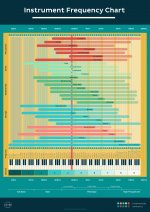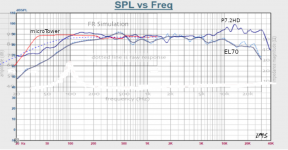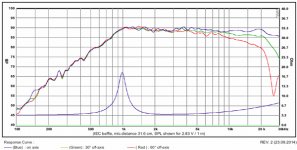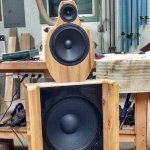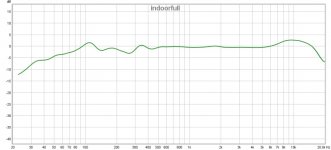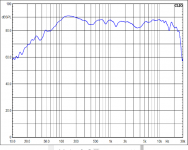Never a doubt there is sound up there, but as the research in the original post I made shows, once you're past middle age you can't hear past 14Khz and once you're in your 60's you've lost around 20db of sensitivity at 4Khz, which is a quarter of what it was when you were in your 20's.
Of course there are always statistical outliers on both ends of the spectrum, for better or worse. Smokers with high blood sugar that have been exposed to sounds over 85db for extended periods will be in the or worse category.
Also, we cannot discount the psychological effect of expectation on perception, and really, getting a hearing test where you are blind to what you are exposed to and when is the only true way to know.
I do believe I'm going to schedule one now, as my curiosity is peaked.
Of course there are always statistical outliers on both ends of the spectrum, for better or worse. Smokers with high blood sugar that have been exposed to sounds over 85db for extended periods will be in the or worse category.
Also, we cannot discount the psychological effect of expectation on perception, and really, getting a hearing test where you are blind to what you are exposed to and when is the only true way to know.
I do believe I'm going to schedule one now, as my curiosity is peaked.
I'm in my middle 60's. I would say my loss is 2 to 4 dB starting at about 8KHz; below that, everything is normal. Like I said; above 15KHz, loss is 20 dB or more. Again, if I turn off my super tweeter; it is very noticeable so don't be afraid to use a super tweeter even if you think you can't hear it.
I can still hear 16kHz but it requires more volume. I'll be 51 in a few months. 14kHz is easy, even at considerably lower volume.
Online Tone Generator - generate pure tones of any frequency
16kHz is particularly obvious when I use the play/stop button repeatedly.
My daughter from the other room: "Stop that noise, it's annoying and the dog is confused."
Online Tone Generator - generate pure tones of any frequency
16kHz is particularly obvious when I use the play/stop button repeatedly.
My daughter from the other room: "Stop that noise, it's annoying and the dog is confused."
What is the frequency and slope of the lowpass on your laser tweeter?
No idea. They are just some powered desktop speakers from Edifier (R1010BT) that I use for my PC.
Laser?
I do think that "can't hear anything above" is inaccurate, as obviously there is a slope there, it's a gradual loss of sensitivity.
And apparently once you qualify for medicare, the roll off above 2Khz becomes pronounced, and the slope likely increases with frequency.
And I have no doubt that you could still easily hear a super tweeter, even if your sensitivity is down 20db at that frequency.
Hey...if harmonic distortion is noticeable at 20db below the fundamental, then even a 20db loss in hearing at a particular frequency will not prevent you from noticing it.
And apparently once you qualify for medicare, the roll off above 2Khz becomes pronounced, and the slope likely increases with frequency.
And I have no doubt that you could still easily hear a super tweeter, even if your sensitivity is down 20db at that frequency.
Hey...if harmonic distortion is noticeable at 20db below the fundamental, then even a 20db loss in hearing at a particular frequency will not prevent you from noticing it.
My Fostex T90A has a custom 2nd order HP. About 0.785 uF and 0.13 mH. Using the Q calculator and assuming exactly 8.0 Ohms gives me a F0 of about 15.76KHz with a Q of 0.622. So, about half way between Butterworth and Bessel. I do not use any attenuation resistors but these are on their own separate amplifier so I can easily adjust the gain to match my personal tastes and compensate for any recording with too little or too much top octave. NOT for everyone obviously but to my old ears; this is one of the best sounding tweeters for us old timers!
Fostex T90A Horn Super Tweeter
Fostex T90A Horn Super Tweeter
No idea. They are just some powered desktop speakers from Edifier (R1010BT) that I use for my PC.
Laser?
Hi Cogitech, I was writing that for oldspkrguy and you popped in there before I posted.
Some call super tweeters "bullet tweeters". I generally refer to them as laser tweeters, as many tape a laser pointer to the top of them and aim them at approximately the location of their ears due to the directivity.
My Fostex T90A has a custom 2nd order HP. About 0.785 uF and 0.13 mH. Using the Q calculator and assuming exactly 8.0 Ohms gives me a F0 of about 15.76KHz with a Q of 0.622. So, about half way between Butterworth and Bessel. I do not use any attenuation resistors but these are on their own separate amplifier so I can easily adjust the gain to match my personal tastes and compensate for any recording with too little or too much top octave. NOT for everyone obviously but to my old ears; this is one of the best sounding tweeters for us old timers!
Fostex T90A Horn Super Tweeter
Very nice! I do not doubt that you can easily notice the difference.
Hi Cogitech, I was writing that for oldspkrguy and you popped in there before I posted.
Some call super tweeters "bullet tweeters". I generally refer to them as laser tweeters, as many tape a laser pointer to the top of them and aim them at approximately the location of their ears due to the directivity.
I see. Thanks for clarifying.
"Perhaps my own hearing roll-off is the reason why my latest speaker driver upgrade is such a welcome change. My old drivers exacerbated my ear roll-off. The new ones compensate"
Makes sense to me.
Also, even a 3/4" tweeter is going to start beaming around 6Khz, so that little tilt up will help compensate for the off axis losses a bit. I don't add them, but if there is one up there I usually do not fix it.
SB Acoustics SB19ST-C000-4 3/4" dome tweeter, 4 ohm...just happened to be the first one I found.
Makes sense to me.
Also, even a 3/4" tweeter is going to start beaming around 6Khz, so that little tilt up will help compensate for the off axis losses a bit. I don't add them, but if there is one up there I usually do not fix it.
SB Acoustics SB19ST-C000-4 3/4" dome tweeter, 4 ohm...just happened to be the first one I found.
Attachments
Last edited:
Well, i'm 42 now and did my last hearing test about a year and a half ago and could still hear untill just under 17kHz (-6dB), and a relative flat response. at 20kHz it was at -14dB And i was a dj for 20 years. But i always had an extreme sharp hearing and i did protect my ears and mostly listen to music on reasonable volume. I do still go out, and mostly not to silent parties (dub soundsystems sessions and so) but always have ear protection and do watch out to where i stand (not in front of the speakes) to protect my ears.
So bland stating that speakers should not go above a certain frequency is not right, your ears are not mine, and statistic averages don't apply for everybody. So when designing speakers you need to keep in mind for who it is and take safety zones.
So bland stating that speakers should not go above a certain frequency is not right, your ears are not mine, and statistic averages don't apply for everybody. So when designing speakers you need to keep in mind for who it is and take safety zones.
It should be noted that natural age related and abuse related hearing loss have different consequences. You could well find HF compensation uncomfortable and even painful after abusing your ears for 30 years. Mine tops out at around 11khz due to abuse. They are very sensitive now. I don't understand the classic remedy of "turning up the volume" to compensate. That just hurts,So you find compensating for the loss sounds unnatural? Interesting.
I'm 54 and I would have to agree. Too much treble or even a bright recording annoys me also.
On the face of it, you would think compensating might help. But my guess is it seems to be the opposite, as we've adjusted to our hearing in everyday life and it doesn't seem normal if compensated in a loudspeaker.
I've listened to more than one speaker that did not extend beyond 10khz and sounded fine to me. Actually helped on some stuff, like many Rush recordings for instance. What in the heck were they mixing those on anyway?
It should be noted that natural age related and abuse related hearing loss have different consequences. You could well find HF compensation uncomfortable and even painful after abusing your ears for 30 years. Mine tops out at around 11khz due to abuse. They are very sensitive now. I don't understand the classic remedy of "turning up the volume" to compensate. That just hurts,
Appreciate you sharing that perspective it's good to know.
I've worked with loud equipment quite often, from chainsaws to planers to AK47's and grenade simulators.
You fire an AK47 on full auto with no ear protection, your ears literally whistle for quite a while after.
I had not thought of this perspective.
This song has a very nice stretched hihat up to 14000Hz. (metal music)
Hammerfall - Let the Hammer Fall - YouTube
I like the mix..
Hammerfall - Let the Hammer Fall - YouTube
I like the mix..
Last edited:
Hello waxx,
Basically what I was saying in post #28
Just referring to myself, not speakers I build and sell. Although no one has ever complained about a scan 10f without a tweeter.
I also tend to roll of the highs a bit, but not that they are not there, just a few dB's less than the rest of the sound. And many seems to like it, not all.
And the set i'm listening now most to and enjoy the most is a test MLTL i build with the new CHN110 fullrange driver, that is also not flat on top, but the treble is there. The response is the published (i still need to measure the MLTL) but it gives an id.
Attachments
- Home
- Loudspeakers
- Multi-Way
- 14khz or 20khz top end; you can't hear the diff
